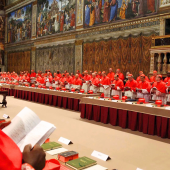The Holy Father’s cry to the climate crisis
Pope Francis has published an Apostolic Exhortation building on his 2015 encyclical, “We’re not reacting enough”, he says, “We’re close to breaking point,” according to Vatican News.
The Holy Father criticizes climate change deniers, saying that “the human origin of global warming is now beyond doubt. And he describes how care for our common home flows from the Christian faith.”
The letter is titled ’Praise God’, for “when human beings claim to take God’s place, they become their own worst enemies.” This is how Pope Francis ends his new Apostolic Exhortation, published on October 4, the Feast of St Francis of Assisi.
It’s a text in continuity with his 2015 encyclical Laudato si’, which is broader in scope.
In six chapters and 73 paragraphs, the Pope tries to clarify and bring to completion that previous text on integral ecology, while at the same time sounding an alarm, and a call for co-responsibility, in the face of the climate emergency, said Vatican News.
The Exhortation looks ahead to the 28th United Nations Climate Change Conference (COP28), which will be held in Dubai between the end of November and the beginning of December.
The first chapter is dedicated to the global climate crisis. Speaking of those who play down climate change, he responds: “What we are presently experiencing is an unusual acceleration of warming, at such a speed that it will take only one generation – not centuries or millennia – in order to verify it.”
The Pope says it is not the fault of the poor. “In an attempt to simplify reality, there are those who would place responsibility on the poor, since they have many children, and even attempt to resolve the problem by mutilating women in less developed countries.”
In the second chapter, the Pope speaks of the technocratic paradigm which consists of thinking that “reality, goodness, and truth automatically flow from technological and economic power as such” and “monstrously feeds upon itself”, taking its inspiration from the idea of a human being without limitations.
In the next chapter of the Exhortation, the pope addresses the weakness of international politics, insisting on the need to foster “multilateral agreements between States”.
In the following chapter, Francis describes the various climate conferences held to date. He recalls the one in Paris, the agreement resulting from which came into effect in November 2016.
Although “a binding agreement, not all its dispositions are obligations in the strict sense, and some of them leave ample room for discretion”, he said. Moreover, there are no sanctions for failure to meet obligations, and there is a lack of effective tools to enforce the agreement, as well as no real sanctions, and no effective tools to ensure compliance, he added.
The Pope mentions his disappointment with the Madrid COP and recalls that the Glasgow COP revived the Paris goals, with many “recommendations”, but “proposals tending to ensure a rapid and effective transition to alternative and less polluting forms of energy made no progress”.
COP27, held in Egypt in 2022, was “one more example of the difficulty of negotiations”, and even though it “marked a step forward in consolidating a system for financing ‘loss and damage’ in countries most affected by climate disasters”, this remained “imprecise” on many points, said the Holy Father.
Looking ahead to COP in Dubai, Pope Francis writes that “to say that there is nothing to hope for would be suicidal, for it would mean exposing all humanity, especially the poorest, to the worst impacts of climate change”.
We must, says the Pope, “keep hoping that COP28 will allow for a decisive acceleration of energy transition, with effective commitments subject to ongoing monitoring. This Conference can represent a change of direction”.
On the subject of protests by groups “negatively portrayed as radicalized”, Pope Francis affirms that “in reality, they are filling a space left empty by society as a whole, which ought to exercise a healthy “pressure” since every family ought to realize that the future of their children is at stake”. - Madonna T. Virola
Radio Veritas Asia (RVA), a media platform of the Catholic Church, aims to share Christ. RVA started in 1969 as a continental Catholic radio station to serve Asian countries in their respective local language, thus earning the tag “the Voice of Asian Christianity.” Responding to the emerging context, RVA embraced media platforms to connect with the global Asian audience via its 21 language websites and various social media platforms.















